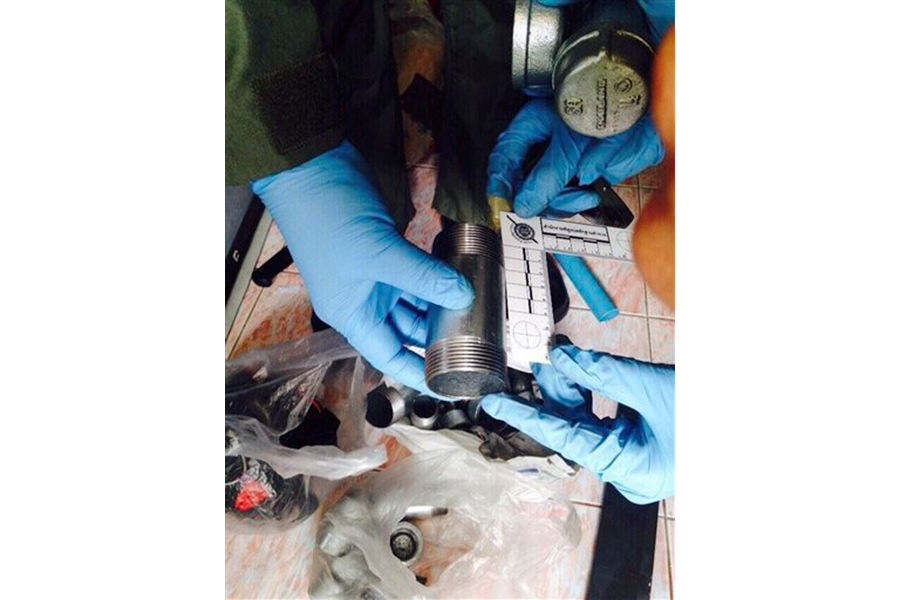Police say Bangkok bombing suspect is not cooperating
| BANGKOK
Thai police said Sunday the man arrested in connection with Bangkok's deadly bombing was being uncooperative, possibly not telling the truth to interrogators and would remain in military custody for at least seven days.
The unnamed foreigner was arrested Saturday at an apartment on the outskirts of Bangkok where police seized bomb-making equipment and fake passports. It was the first possible breakthrough in the investigation into the Aug. 17 blast at the Erawan Shrine, which killed 20 people, more than half of whom were foreigners, and injured more than 120 others.
National police spokesman Prawuth Thavornsiri told The Associated Press that police found "more than 200 passports" in the man's apartment, including many that were empty, and police were exploring the theory that he was part of a network that provided fake passports to migrants. He said the passports were from one country, but wouldn't say which one.
He did not explain why a passport gang might target a religious shrine.
Much remains unknown about the suspect, including his nationality, his motive, his relationship to the alleged bombing network or if he was plotting an attack, Prawuth said, adding that another attack was "possible" because police found 10 detonators.
He said police were working with "a number of embassies" and interpreters to try to establish the man's nationality, adding that he did not speak Thai but spoke some English – and the interrogation was going slowly.
"He is not cooperating much. From our preliminary investigation, we think he isn't telling us the truth," Prawuth said, declining to elaborate. "He told us how he entered Thailand but we don't believe everything he says."
Authorities have dodged questions about whether the suspect is believed to be Turkish, saying that he was traveling on a fake passport. Images circulated online after his arrest of a fake Turkish passport with the apparent suspect's picture.
"We don't know if he is Turkish or not," Prawuth said Saturday. "The passport you have seen is fake."
The Turkish Embassy in Bangkok could not immediately be reached for comment on Sunday. A Turkish government spokesman contacted a day earlier in Istanbul said he had no information on the suspect or any possible Turkish link to the attack.
The blast at the Erawan Shrine was unprecedented in the Thai capital, where smaller bombs have been employed in domestic political violence over the past decade, but not in an effort to cause large-scale casualties.
The shrine is a popular tourist destination, particularly with Chinese visitors, who are an important segment of the lucrative tourist market. At least six of the dead were from China and Hong Kong.
No one has claimed responsibility for the blast, sparking several theories into who might be behind it.
Possible suspects include parties seeking to avenge Thailand's forced repatriation of ethnic Uighurs to China. Uighurs are related to Turks, and Turkey is home to a large Uighur community.
Other theories included Muslim separatists from southern Thailand, opponents of Thailand's military government and feuding factions within the security services.
On Sunday, Prawuth put forth another theory, that the suspect belonged to a fake passport ring – "an illegal network that sends people who don't have passports to third countries" – and was angry at officials for a crackdown on fake passport operations.
"The police chief thinks it's personal revenge, anger from a group that is not happy with the work of officials, that we have arrested some of his people," Prawuth said. "We have been very strict about getting rid of fake passports."
Prawuth said that the suspect, who faces charges of possessing unauthorized explosives, was in military custody and could be held for renewable periods of seven days.
Until Saturday's arrest, police had focused on a prime suspect who was seen in a security camera video leaving a backpack at a bench near the open-air shrine and then walking away. A separate camera showed the man, wearing a yellow T-shirt, on the back of a motorcycle taxi leaving the site.
Prawuth said it was too soon to say if the suspect arrested Saturday was the man seen in the video.
"We still have to work out the details," Prawuth said. "But we are very certain he's part of the network. Definitely."






